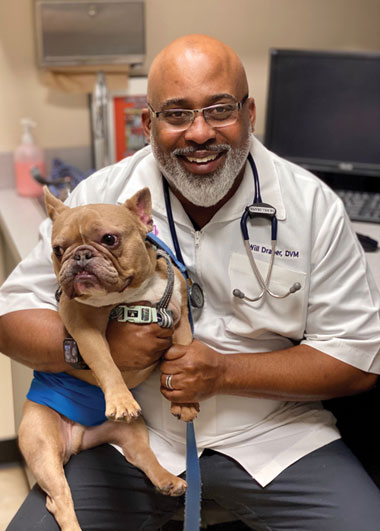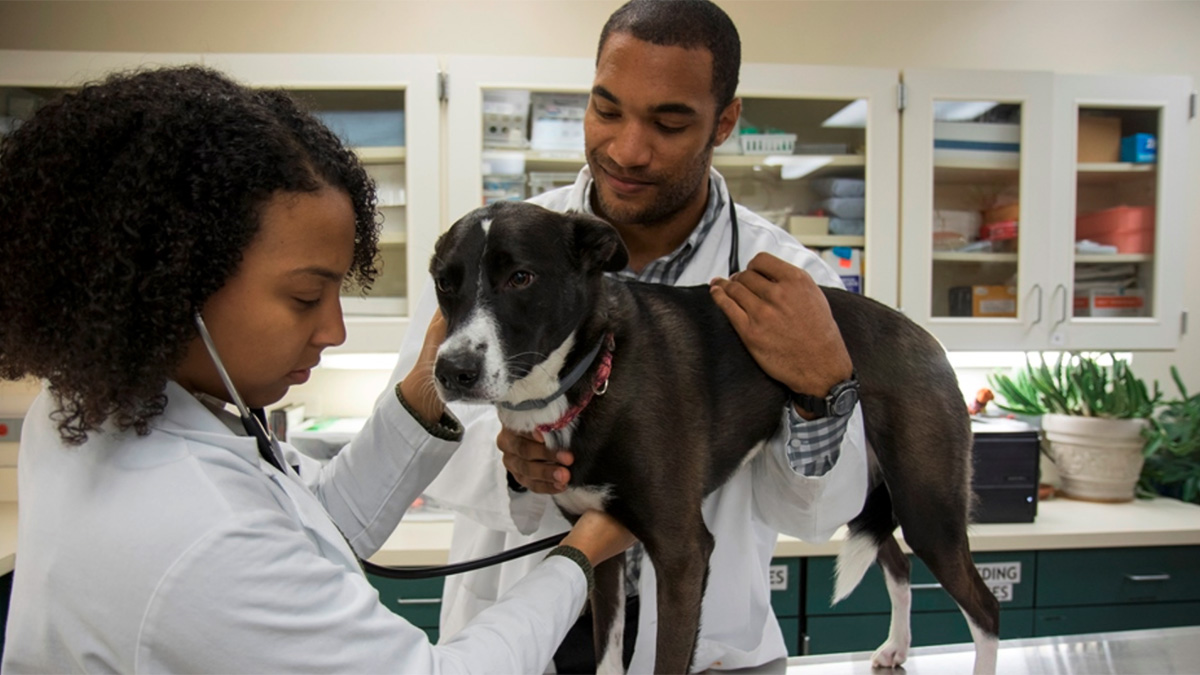How to prepare ahead of your pet’s Pet Cancer Surgery
Comprehensive Guide to the Solutions Offered by a Vet Oncologist
Veterinary oncology includes a wide array of solutions focused on dealing with and diagnosing cancer cells in animals. Veterinary Cancer Specialist. Oncologists use advanced diagnostic strategies and offer different treatment options tailored per pet's needs. They likewise focus on supportive treatment and supply beneficial resources for animal owners. Understanding these services is vital for making notified decisions. What specific elements of vet oncology can significantly affect a pet dog's treatment journey?
Comprehending Veterinary Oncology
Vet oncology is a specific field concentrated on treating and identifying cancer cells in pets. This technique incorporates a large range of methods, from medical treatments such as radiation treatment and immunotherapy to medical treatments focused on eliminating lumps. Vet oncologists are trained to identify the one-of-a-kind manifestations of cancer in numerous types, enabling them to tailor treatment plans to individual patients.
In enhancement to standard therapies, vet oncology stresses supportive treatment, which plays a vital role in enhancing the top quality of life for afflicted pets. This consists of discomfort monitoring, nutritional support, and palliative treatment alternatives. Cooperation with family pet owners is essential, as they are essential to decision-making concerning their family pets' therapy courses. As research study advances, veterinary oncology proceeds to progress, supplying brand-new hope and enhanced end results for pets identified with cancer cells. On the whole, this field is essential for dealing with the complexities of cancer in companion pets.
Advanced Diagnostic Techniques
Advanced diagnostic methods play an important role in veterinary oncology, providing vital insights into the visibility and degree of cancer cells in animals. Imaging modalities such as ultrasound, CT scans, and MRI are generally used to visualize lumps and evaluate their characteristics. Furthermore, biopsy treatments are necessary for obtaining tissue samples, allowing for clear-cut medical diagnosis and tailored treatment strategies.
Imaging Modalities Utilized
Imaging techniques play a necessary role in the diagnosis and management of cancer in pets. Vet oncologists utilize different advanced imaging techniques to assess growth transition, presence, and size. Radiography, or X-rays, supplies an initial sight of bone and breast problems, while ultrasound supplies real-time imaging of soft tissues, enabling in-depth examination of inner body organs. Calculated tomography (CT) enhances visualization of complicated anatomical frameworks and allows 3D reconstructions, assisting in accurate tumor localization. Magnetic resonance imaging (MRI) is indispensable for soft cells differentiation, particularly in brain tumors. Additionally, nuclear medicine methods such as positron emission tomography (PET) help identify metabolic activity within lumps. Collectively, these techniques boost diagnostic precision, leading efficient treatment techniques for oncological patients.
Biopsy Treatments Explained
Adhering to the initial analysis with imaging modalities, obtaining a clear-cut diagnosis usually requires cells tasting via biopsy procedures. Veterinary oncologists utilize different biopsy techniques based on the lump's location and qualities. Great needle ambition (FNA) is a minimally invasive approach that extracts cells for cytological exam, perfect for superficial masses. Core needle biopsies give bigger cells examples and are beneficial for deeper lumps, permitting histopathological evaluation. Surgical biopsies entail excising a part or the entire tumor, facilitating extensive evaluation. These treatments not only confirm the existence of cancer cells yet likewise aid identify its kind and quality, leading treatment decisions. Each biopsy approach is selected carefully to balance analysis accuracy with person safety and comfort.
Therapy Choices for Cancer Cells in Pet dogs
When a pet dog is identified with cancer cells, a variety of therapy alternatives appear to help improve and handle the disease top quality of life. Vet oncologists typically suggest a multidisciplinary approach tailored to the individual animal's requirements, which may consist of surgery, radiation treatment, immunotherapy, or alternate treatments.
Surgery is typically utilized to remove lumps and affected cells, potentially bring about full remission in many cases. Radiation therapy intends to ruin and target cancer cells, minimizing growth dimension and relieving signs - Veterinary Oncology Services. Immunotherapy takes advantage of the family pet's body immune system to combat cancer much more successfully, while alternative treatments might consist of acupuncture or natural supplements to sustain total health
Each therapy alternative brings its very own benefits and risks, and vet oncologists function very closely with pet dog proprietors to design a thorough plan that aligns with the pet dog's specific medical diagnosis and the proprietor's desires. The supreme goal is to boost the family pet's comfort and lifestyle throughout their cancer cells trip.
Chemotherapy for Animals
Radiation treatment is an usual treatment alternative for pets diagnosed with cancer and is often made use of together with various other treatments detailed by veterinary oncologists. This therapy entails the administration of specific medications created to target and damage cancer cells, therefore reducing tumor dimension and protecting against the spread of the illness. Vet oncologists tailor chemotherapy procedures based upon the sort of cancer cells, the pet dog's total wellness, and the desired treatment outcome.
Adverse effects can occur, as these medications might likewise affect healthy and balanced cells. Usual reactions consist of nausea, throwing up, and temporary changes in appetite - Veterinary Oncology Services. Veterinary oncologists are equipped to manage these negative effects successfully, making certain the family pet's comfort throughout the treatment procedure. Regular surveillance through blood examinations and follow-up appointments is necessary to assess the family pet's reaction to radiation treatment and make essential adjustments. Inevitably, radiation treatment can provide considerable advantages, boosting the lifestyle for animals facing cancer diagnoses

Radiation Treatment in Vet Medication
Radiation treatment acts as a reliable therapy alternative for pets identified with localized lumps, using a targeted method to cancer cells monitoring. This method makes use of high-energy radiation to damage the DNA of cancer cells, inhibiting their capacity to proliferate. It is especially useful for tumors that are not amenable to surgical removal or for cases where surgery might not be possible due to the growth's place.
Vet oncologists tailor radiation procedures based on growth kind, dimension, and location, along with the i loved this pet dog's total health. Treatment can be delivered via exterior light beam radiation or brachytherapy, each with distinct advantages. Normally, multiple sessions are required to take full advantage of effectiveness while decreasing side impacts.
Family pets might experience momentary responses such as skin irritability, the general purpose is to shrink lumps and alleviate signs and symptoms, inevitably improving the animal's prognosis and high quality of life. Accordingly, radiation therapy plays a vital function in comprehensive cancer cells treatment.
Palliative Treatment and Lifestyle
Palliative care in veterinary oncology concentrates on boosting the high quality of life for pets encountering incurable diseases, making certain convenience and self-respect in their final days. This specific technique focuses on pain administration, signs and symptom control, and emotional support. Vet oncologists examine each family pet's private demands, tailoring interventions to relieve discomfort and boost overall wellness.
Techniques may consist of carrying out medications for discomfort relief, managing queasiness, and dealing with various other traumatic signs and symptoms. In addition, nutritional support is often offered to keep strength and boost hunger. The emotional aspect of palliative treatment is equally essential; developing a tranquil environment aids decrease stress and anxiety for both family pet and owner.
Eventually, the goal of palliative treatment is to permit pet dogs to appreciate their staying time with as much pleasure and dignity as feasible. By concentrating on comfort and lifestyle, vet oncologists play a necessary role in ensuring that animals and their households navigate this tough journey with empathy and understanding.
Support for Pet Dog Owners Throughout Treatment

Psychological Support for Proprietors
Charting the emotional landscape throughout a pet dog's cancer therapy can be an overwhelming experience for owners. The uncertainty bordering medical diagnosis and prognosis can result in sensations of vulnerability, sadness, and stress and anxiety. Vet oncologists identify the relevance of psychological support and usually supply support to help owners navigate this challenging journey. Communication is crucial; talking about therapy choices and prospective results can relieve some worries. Additionally, offering reassurance that emotional responses are legitimate fosters a helpful atmosphere. Many oncology clinics might additionally suggest support system or counseling solutions tailored for pet dog owners, helping with shared experiences. Urging owners to focus on self-care throughout this time around is vital, as their psychological well-being straight affects their family pet's comfort and overall therapy experience.

Resources and Educational Materials
Steering via the complexities of a pet dog's cancer cells treatment can be frightening for proprietors, making accessibility to reliable resources and instructional products necessary. Vet oncologists frequently give a selection of handouts, pamphlets, and online products that discuss treatment choices, possible adverse effects, and care approaches. These sources aid demystify the procedure and empower pet owners to make enlightened choices. Furthermore, several oncology facilities use accessibility to sustain online forums and groups where owners can get in touch with others facing similar challenges, cultivating a feeling of neighborhood. Educational seminars and webinars carried out by vet specialists even more improve understanding, ensuring why not look here that proprietors are fully equipped to browse their animal's trip via cancer cells treatment with confidence and knowledge.
Often Asked Concerns
Exactly How Can I Prepare My Pet Dog for a Veterinary Oncology Check Out?
Preparing an animal for a veterinary oncology go to entails event clinical documents, keeping in mind symptoms, and making certain the family pet is comfy. A tranquil demeanor and acquainted items can help ease anxiety during the visit.
What Are the Indications My Pet May Have Cancer?
Signs that a pet dog may have cancer cells consist of unusual weight loss, persistent vomiting or diarrhea, unusual lumps or swellings, sleepiness, changes in appetite, problem breathing, and changes in behavior. Trigger vet interest is crucial.
Exactly How Can I Assistance My Pet Dog Emotionally Throughout Treatment?
Sustaining a pet psychologically throughout treatment involves giving convenience, preserving routines, using gentle affection, and making read what he said certain a tranquil atmosphere. Participating in silent play and regular friendship assists relieve tension and cultivates a sense of safety.
Exist Alternative Therapies for Family Pets With Cancer cells?
Different therapies for animals with cancer include acupuncture, herbal therapies, and dietary assistance. These strategies might enhance conventional treatments, promoting overall wellness. Consulting with a vet is essential for efficient and safe assimilation of different therapies.
What Expenses Should I Anticipate for Veterinary Oncology Services?
The expected costs for vet oncology solutions can differ substantially, typically influenced by diagnostics, treatments, and continuous treatment. Family pet proprietors ought to plan for expenditures ranging from appointments to specialized therapies, showing the intricacy of cancer monitoring.
Cooperation with animal owners is vital, as they are integral to decision-making regarding their pets' therapy paths. Each therapy alternative carries its very own advantages and threats, and veterinary oncologists function closely with pet dog proprietors to make a complete plan that lines up with the pet's certain medical diagnosis and the proprietor's wishes. Pet dogs might experience short-lived responses such as skin inflammation, the general goal is to diminish tumors and reduce symptoms, ultimately boosting the pet's diagnosis and top quality of life. Support for pet dog proprietors throughout therapy is crucial in guiding via the psychological difficulties connected with a family pet's cancer cells medical diagnosis. Preparing a pet for a vet oncology visit involves event medical documents, keeping in mind signs, and making sure the family pet is comfortable.